Panel Beating - 11th April 2006
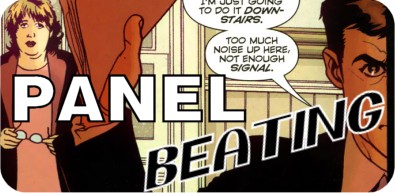
Before long, I think I'm going to have to change the title of this column to "Never Comes Out On Time". Either that, or I'll just start aiming to post my reviews on a Monday or Tuesday, rather than the frankly quite over-optimistic Saturday. Anyway, this week sees things actually start quite majorly happening in Infinite Crisis, while they just get more interesting in Detective Comics. Teen Titans provides One Year Later's most blatant example so far of a handy exposition issue, while Ex Machina gets more disturbingly topical by the minute (more so for Londoners than for New Yorkers this week), and joy rings out as we're blessed with another issue of Ellis and Cassaday's magnum opus Planetary.
I'd also just like to take a quick moment to mention how good issue #1 of Brian Wood's Local, reprinted last week, is. Regular readers of NTS' other comics column Alternate Cover will of course be familiar with Mr Hunt's love of all things Wood, but Local represented my first exposure to him. And it was really good stuff. As a self-contained issue, it was a clever little story in itself, but the concept of the series is a quite intriguing hook. Well worth checking out, especially as the early issues are all going to reprint.
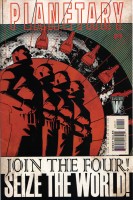 |
PLANETARY #25 (PICK OF THE WEEK!)
Publisher DC (Wildstorm) • Writer Warren Ellis • Artist John Cassaday
A new issue of Planetary has always been something to cherish. Back in the day, it was because they came out so infrequently that it was just amazing to see one on the racks. Nowadays, though, with the book on something vaguely approaching a regular schedule, the sense that every issue must be treasured comes more from the fact that it's going to be ending within a few issues' time.
The other reason it's always worth cherishing an issue, of course, is that they're always so bloody good. In fact, it's something of a review-proof book, now - if you're already reading it, you don't need to be told how good it is. If you're not already reading it, then it's too bloody late for you to jump onboard now, but you should go and get the first trade instead.
It's not quite the staggeringly must-read stuff it was in its early days now, though. The problem, really, is that it's done an X-Files - the wonderful, individual self-contained stories, each homaging and referencing a different part of 20th Century fictional culture, have been replaced by an ongoing storyline, one which the loyal fans will stick with in order to see it through to its conclusion, but which doesn't really hold as much interest as the series used to. Indeed, this main storyline - of Elijah's attempts to take down the Four - doesn't really feel as "big" or significant as it should. Drums and Jakita seem constantly bewildered by Elijah's behaviour, and nobody really seems to believe that he can succeed. Basically, what should be an absolutely massive, explosive story filled with twists and turns just hasn't had time to breathe properly - the series only consists of 25 issues so far, and roughly half of those have been dedicated to the main plot arc.
That's not to say, though, that it isn't technically as brilliant a comic as ever. There are some big revelations on show here, firstly regarding John Stone's loyalties, but then and more importantly finally revealing how and why the Four got their powers, and - quite unsettlingly - what Randall Dowling's actually are. There's a superbly choreographed fight sequence, some terrific dialogue (Stone's "Well, I'm so glad you saved me from the Four" is a hoot, especially with the facial expression Cassaday gives him) and the art is as perfect as it has been for the last twenty-four issues. This book's covers, too, remain pretty much the best on the stands, and this is among the best of the lot.
Still, though, there's an uneasy sense that there's far more that could be done with the "Planetary vs The Four" story than can really be adequately explored in the thirteen issues since Elijah regained his memory. There's only one or two issues of this book left to go, and I can't help feeling I'm going to be left with a sense of "Well, is that it?" when it finally finishes. For all the faults in the wider scheme of things, though, this remains one of the best comics in terms of craftsmanship available today. A
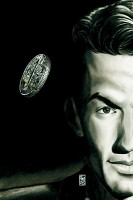 |
DETECTIVE COMICS #818
Publisher DC • Writer James Robinson • Layouts Leonard Kirk • Finishes Andy Clarke & Wayne Faucher
There's a curious thing going on with James Robinson's eight-part Batman : One Year Later story. Unlike over in the Superman books, where "Up, Up and Away" is spread over the two titles with little or no distinction between which is which (essentially, it's a single story on a fortnightly schedule), Robinson's "Face the Face" actually seems to be making use of the fact that Detective Comics and Batman are two different books. The most obvious distinction is the fact that the books have different art teams (whereas Superman and Action Comics have the consistency of Pete Woods), but at the moment, they actually feel like two different titles, despite the fact that they're telling successive parts of the same story.
One thing, though, is clear - the two issues of Detective so far have been much better than the one of Batman. Maybe it's because this story is a mystery, with a bit of a darker, noir feel, rather than a guns-blazing action story of the sort better suited to the "main" title. Ergo, two weeks ago Robinson gave us just that - Batman and Robin taking down Poison Ivy in textbook fashion. This week, though, he's back to the nitty gritty of the mystery, and the intrigue is ramped up a notch with another of Batman's B-list villains taken down (one I was quite fond of, I must admit), and the continuing question of "Well, it bears all the hallmarks of Two-Face, but Two-Face is good now, so it can't be, but it might be, but then again it might not". The latter point is something that feels like it's been done to death in the Batman mythos over the years, but I don't mind seeing it again as long as it's done well and there's a new twist to the usual resolution (the usual resolution being that yes, he has gone evil again, yawn).
The artwork definitely feels better suited this month than it did last, and is also a definite improvement over the art in Batman. There are another couple of scenes (one with Tim, one with Alfred) that continue the "de-assholing" of Batman, which is always a welcome thing to see, and I'm liking the increasing emphasis that's being placed on Tim's role in the whole setup. At the moment, it continues to be so far so good, with the story coming together nicely, although I really don't feel that Robinson has begun to flex his muscles properly yet.
It's with the "backup story", though, that this becomes really good. A few pages of vignette with perennial 'Tec backup character Jason Bard being "recruited" by Batman, it's tremendously entertaining stuff, with snappy dialogue and a nice (if slightly cliched) little twist. If this is the sort of thing that's going to start filtering into the pages of Detective Comics from now on, then it's very promising indeed. I'm not hugely familiar with Bard as a character (I had to look him up to check that Robinson didn't just create him), but I like him already, and the idea of him as a "daytime" counterpart to Batman is one rich in possibilities, one that I can see Paul Dini hopefully picking up on, and one that seems perfectly suited to the sort of tone this book should be aiming for.
There's still just one thing that bugs me, and that's the fact that if it was so easy to make the Batman and Superman books this good again (and it really has been a quite startling transformation), then why the hell did it take DC so long to do it? A
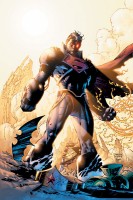 |
INFINITE CRISIS #6
Publisher DC • Writer Geoff Johns • Pencils Phil Jimenez, Jerry Ordway, George Perez, Ivan Reis • Inks Ooh, lots of people.
In which, wow, some stuff actually happens. Someone actually quite important dies (not like we didn't see it coming, and not like it wasn't spoiled by this week's Detective and Titans, and even last week's Action Comics), some plans finally start to come together, other plans finally fall apart, and DC begin to set out what the new status quo for their universe is going to be. Oh, sod it. The book's been out nearly a week now. I'm going to assume you've either read it, know the spoilers, or don't care about them. If you really are still going to read it and have managed to avoid what happens... look away... now.
Well, massive events aside, this is actually by far the best issue of Infinite Crisis so far, because it's probably the first to make it genuinely feel like a massive event, with Big Things happening. It's also the most coherently told. It's one where the multiple artists thing actually doesn't jar all that much, and in fact visually it flows together rather seamlessly. There are some really good moments, whether it's yet another "God, he's back to the way he USED to be!" Batman bit, or the myriad "hey, look, it's!" bits on the multiple Earths, or Psycho Pirate's quite surprisingly visceral demise.
Of course, PP isn't the only character to shuffle off the mortal coil in this book, and the death of Superboy (for those not entirely up on DC continuity, this is the Superboy who originally appeared in the Death/Return of Superman story just over ten years ago, and who is actually a clone made up of Superman and Lex Luthor's DNA) wasn't exactly an unexpected surprise. Someone major was likely to get killed off, and the omens have been building for poor old Conner for a while. It's well-handled, though - his sacrifice genuinely makes a difference to the plot, and it genuinely feels like a proper, powerful moment. Meanwhile, we get a major continuity change, in that all the multiple Earths are seemingly fused back together into one again. Yep, folks - after the teasing hints that Infinite Crisis was going to undo Crisis on Infinite Earths, what it's actually done instead is undo it, and then repeat it.
Not that I'm wholly against this - the reason all the multiple Earths were got rid of in the first place was that things had become too damned confusing, and I see no reason why Morrison et al's "Hypertime" concept can't be seen as the way forward for "imaginary" and "alternate" stories in the DCU (it is the DCU for "Universe", after all, not the DCM for "Multiverse"). However, sometimes, when things have got a bit out of hand, what you really need to do is pick them apart again before you can smoosh them all back together - and that's what's been done here. And come on, did anyone really expect that Alex's plans would ultimately end up resulting in yet another new, unified, singular Earth being created?
All in all, though, after six long issues, it finally feels like this is going somewhere. I'd say it's almost a shame that it's about to end, now that it's starting to feel a bit more properly epic - but as I've stated before, I'd rather see it out of the way so we can fully enjoy 52 and One Year Later. It's been a bit of an up and down ride, but at least now it's beginning to feel like it means something. A-
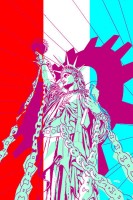 |
EX MACHINA #19
Publisher DC (Wildstorm) • Writer Brian K. Vaughan • Pencils Tony Harris • Inks Tom Feister
Ever since the last page of issue #1 panned back to reveal a solitary tower of the World Trade Center standing proud (the hook being that former superhero and incumbent Mayor of New York Mitchell Hundred suited up one last time on 9/11 but still feels guilty that he only stopped the second plane), Brian K. Vaughan has never shied away from making Ex Machina gut-punchingly relevant. This might be the first time, though, that he's had a moment that actually feels far more relevant to a British reader than an American one, as this issue closes with a scene that's a little closer to the Jean de Menezes incident - tube station and all - than feels entirely comfortable.
Last issue, of course, ended with a quite horribly depressing scene, and it tainted the book a little bit. Here, the strand from that particular scene is resolved, and it's at least comforting to see some comeuppance happen within the first few pages. After that, however, the book really doesn't get all that much more upbeat than it has been lately, culminating in the aforementioned incident.
The annoying thing, of course, is that it's so bloody well done, it's hard to want to put it down just because it's a little depressing. The closing scene is particularly powerfully written, and Harris' art expertly captures the changing demeanour of the characters concerned, particularly on the face of the poor unnamed suspect - going from nervous jocularity to outright panic in a matter of panels. There's also a strong scene between Hundred and Wylie, two characters whose relationship has always been a vital crux of the series, and one which takes another important turn here.
Mitchell Hundred was such a likeable character in the early part of this series that it's difficult to watch now as things spiral out of his control - he's a good, intelligent man, but he's in a situation that he genuinely doesn't know how to deal with, and he's becoming increasingly pained and defeated looking. We're surely beginning to see the seeds being sown for the end of his time in office - it's worth remembering that the series, always intended to be finite, began with Hundred narrating to us from the present day after his incumbency has ended - and jt's this, along with the somewhat brutal topicality, that's making this book quite a difficult read. But with Vaughan's inherent grasp of dialogue, voice and plotting - not to mention the amount of work and reading he's clearly put into the subject matter - and Harris' exquisite art, it's a comic that just can't be ignored. A-
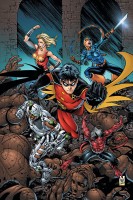 |
TEEN TITANS #34
Publisher DC • Writer Geoff Johns • Pencils Tony Daniel • Inks Art Thibert & Kevin Conrad
Geoff Johns has done a few of these One Year Later things already, but I have to say that Teen Titans is his most blatant example yet of using the first issue to do very little other than expound about the new setup.
Admittedly, there's a lot that's new to take on board with Titans - the lineup has almost entirely changed. So it's not an unreasonable or unexpected thing to take an existing character (Cyborg), have them wake up gradually with little or no memory of the later stages of the Crisis, and then have them be walked through exactly what's changed. And credit to Johns, because he does so in a quite entertaining way. First off, there's Vic waking up intermittently in a manner reminiscent of Robocop (or is it Red Dwarf?), followed by lots of neat little touches as he discovers what's happened to the team in the year that he's been out. There are succinct summaries of the post-Crisis fates of certain characters, some good lines here and there ("We're the new Teen Titans!" "I was a new Teen Titan." "Uh, the new new Teen Titans?"), and a strong scene as Vic discovers what happened to a certain Clone of Steel.
Unfortunately, the main problem that Johns is dealing with here - and it's one that's even acknowledged by the characters themselves - is that the Titans line-up we've now got is absolutely piss-poor : Robin, Kid Devil, Ravager, Cyborg. Oh, and "Wendy and Marvin", who are apparently a reference to the old Super Friends show, and who already irritate the hell out of me. There's no Superboy (obviously), no Wonder Girl (although the cover suggests that'll change before long), no Raven, no Beast Boy (again, solicitations suggest he will at least play a part in the book, if not the main team), and no Kid Flash (there's a tantalising mention of him, but we're still none the wiser as to his post-Crisis status, which is a tad worrying). In short, there's very little to engage with at the moment, and very little remains of the team that rose from the ashes of Peter David's brilliant Young Justice.
It's still a quite decent read, and certainly not among the worst that One Year Later has had to offer so far. But aside from the fact that it's yet another book in which Robin plays a prominent role, I'm really not sure that there's enough going on just yet to make me keep wanting to come back for more. B+
About this entry
- By Seb Patrick
- Posted on Wednesday, April 12 2006 @ 12:01 am
- Categorised in Comics
- 0 comments
